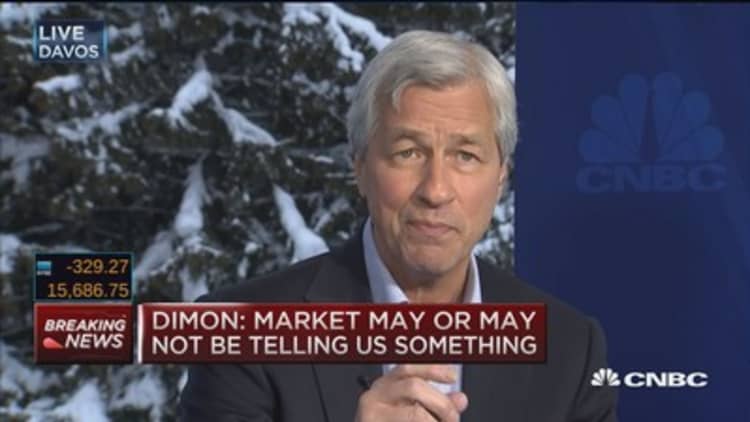



The recent equity sell-off could indicate a marketwide adjustment to new global conditions, JPMorgan Chase Chairman and CEO Jamie Dimon said Wednesday.
"When the market is this bad, it's reasonable to say it might be telling you something, but it's also reasonable to say 'maybe it's not,'" Dimon told CNBC's "Squawk on the Street" at the World Economic Forum in Davos, Switzerland.
"My own view is that you've had four or five things very different that are taking place," Dimon said. "China scared people with this bungling of the yuan — their currency — and their stock market, and their lower growth changed flows around the world. Commodity prices are down substantially now."
Dimon made his remarks in the midst of another tumultuous trading session, sparked by falling oil prices. U.S. crude prices hit a fresh 2003 low on Wednesday, and have fallen more than 25 percent in 2016.
"I'm hopeful that this is just all a big adjustment," Dimon said. "A fast adjustment might be better than a painful, slow death."
The Dow Jones industrial average briefly tumbled more than 400 points Wednesday, while the and Nasdaq composite both dropped more than 2.5 percent. Major U.S. indexes kicked off the year on the wrong foot, by falling into correction territory, down at least 10 percent from their 52-week highs.
Concerns over a global economic recession have also contributed to the recent sell-off. On Tuesday, the International Monetary Fund cut its global growth forecast for 2016 to 3.4 percent, down from 3.6 percent.
This, along with other weak economic forecasts, have raised questions as to whether or not the Federal Reserve will continue on its path to normalization.
However, Dimon said, "I've always said normalization is a good thing."
"I don't believe raising rates 25 basis points is tightening, at all," he said. "I don't believe these first 25, 50, 75 basis points will not take any effect. As long as the U.S. economy is strong, they should raise."








